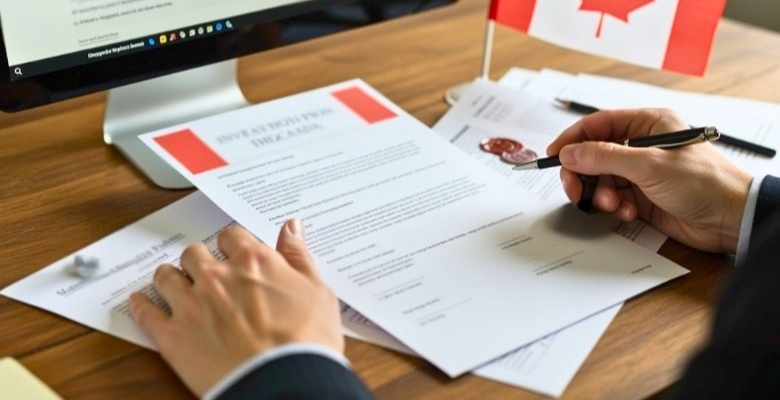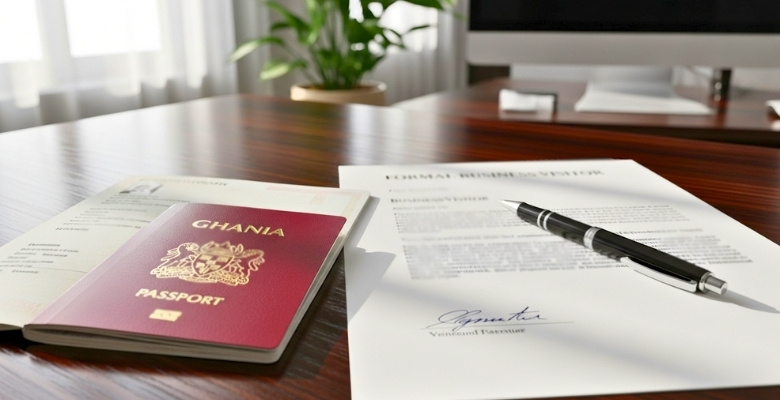A notarized invitation letter often sounds more formal than a regular one, with a notary public verifying and stamping it for authenticity. Many travelers come across this requirement while preparing their visa documents, which naturally makes them wonder: Do I need a notarized invitation letter to visit Canada?
You do not always need a notarized invitation letter to visit Canada. Most visa offices accept a regular signed letter if it includes complete and truthful details. However, some visa offices in certain countries may specifically ask for notarization as part of their checklist. The need depends on your visa type, purpose of travel, and the rules of the visa office handling your application.
Are you curious whether your own case needs notarization or if a simple signed letter will be enough? If yes, then continue reading this article, because here you will find all the important details, examples, and step-by-step guidance to fully understand this topic.
Do I Need a Notarized Invitation Letter to Visit Canada?
Visiting Canada may require extra documents, like an invitation letter. Many wonder if it must be notarized, but this depends on the visa office’s rules. Always check these requirements before starting your application to avoid delays or mistakes. Let’s go through everything you should know about this, including the letter of invitation Canada.
Invitation Letter Basics
An invitation letter is a written request from someone in Canada asking you to visit. It explains why you are traveling, your relationship with them, and your stay plans. It helps your visa application, but cannot replace meeting all other visa rules.
Notarization Meaning
Notarization is when a notary public confirms the signer’s identity and stamps the letter to make it official. This step can make the document look more formal, but Canadian visa offices do not always require it for an invitation letter.
When Notarization Helps
Notarizing an invitation letter can help make it look more credible and trustworthy. It is especially useful if your visa case is complicated, your relationship with the inviter is new, or your home country has a higher risk of document fraud. For example, if you are planning to attend family events, tourism activities, or even conferences in Canada, a notarized invitation letter can sometimes make your purpose of travel clearer.
When It Is Not Needed
You don’t always have to notarize an invitation letter when applying to visit Canada. In many cases, a regular signed letter is enough as long as it has all the right details and meets the visa office’s requirements. The main thing is to follow the rules for your region.
You usually do not need a notarization when:
- The visa office for your country does not list notarization as a requirement.
- The inviter is providing a complete and signed letter with accurate details.
- You have other strong supporting documents to prove your visit’s purpose.
- Your relationship with the inviter is clear and easy to verify.
- There are no special instructions from the visa office asking for notarization.
Letter Content
Whether notarized or not, the letter must be clear, truthful, and complete. Include the inviter’s full details, their status in Canada, your relationship, the visit’s purpose, stay duration, and accommodation. A well-written letter helps the visa officer understand your plans easily.
Here’s a sample template you can check out:
To:
Visa Officer
[Name of Canadian Embassy/Consulate or Visa Office]
[City, Country]Subject: Invitation to [Visitor’s Full Name] – Passport No. [Passport Number]
Dear Visa Officer,
I, [Your Full Name], residing at [Your Address in Canada], am writing this letter to invite [Visitor’s Full Name], who lives at [Visitor’s Address in Home Country], to visit me in [City, Province, Canada] from [Proposed Start Date] to [Proposed End Date].
I am a [Canadian citizen / permanent resident / other legal status] in Canada. My date of birth is [DD/MM/YYYY], and my Canadian passport/PR card number is [Document Number].
Purpose of Visit:
The purpose of the visit is to [state reason – e.g., spend family time, attend a family event, tourism, special occasion]. During the stay, we plan to visit [list some places or events].Accommodation and Expenses:
The visitor will stay at my home located at [full address]. I will [state if you will cover expenses or if the visitor will cover their own].Relationship to the Visitor:
I am the [state relationship – e.g., cousin, friend, sibling] of [Visitor’s Name], and we have known each other since 2026.My Information:
( Inviter information)
Visitor’s Information:
(visitor information)
I assure you that [Visitor’s Name] will return to [his/her] home country before the visa expires and will comply with all Canadian immigration laws during the visit.
Please feel free to contact me for any further information.
Sincerely,
[Signature]
[Your Printed Full Name]
the full version here.
Common Misunderstandings
Some people believe that getting a notarized invitation letter will make their visa approval certain, but that is not the case. The invitation letter is only one part of your application, and many other factors decide the final outcome. Common misunderstandings include:
- Thinking notarization guarantees visa approval.
- Believing the letter alone is enough without the other required documents.
- Ignoring the need to prove strong ties to the home country.
- Assuming the visa officer will not check other parts of the application.
- Believing notarization can replace financial or travel proofs.
Checking Updates
Visa requirements can change over time. What was optional last year could be required this year. Always check the official Government of Canada website or the page for your local visa office before submitting your application. This simple step helps you avoid using old or incorrect information.
Alternatives to Notarization
If you decide not to notarize the letter, you can still make it stronger by adding proof of your relationship, such as copies of the inviter’s ID, proof of their legal status in Canada, past travel photos together, or even a travel plan. These extras can help the visa officer feel confident that the invitation is genuine.
You don’t always need a notarized invitation letter to visit Canada. Whether you choose to notarize or not, the key is to prepare a clear, truthful, and well-supported application that follows the latest visa office requirements. A notarized letter of invitation Canada may still add extra strength if your case needs more proof of credibility.
How to Check If Your Visa Office Requires a Notarized Invitation Letter for Canada?
Before applying for a Canadian visa, it’s important to know if your visa office asks for a notarized invitation letter. The requirement is not the same everywhere, so a quick check can save you time and avoid mistakes.
1. Go to the Official IRCC Website
Start by visiting the official Immigration, Refugees and Citizenship Canada (IRCC) website. This is the main government site that provides accurate, up-to-date information for all types of Canadian visa applications. Using the official site helps you avoid outdated or incorrect details from unofficial sources.
2. Search for “Visa Office Instructions”
Once on the IRCC site, use the search bar and type “Visa office instructions”. This section is designed for applicants from different countries and outlines specific document requirements for each visa office. It is the most direct way to find out what documents are required for your application based on your location.
3. Select Your Country or Region
From the list of countries, choose the one where you plan to submit your application. Each visa office may have its own checklist and special requirements. When you click on your country, you will see a detailed list of documents and guidelines that apply only to applications handled by that office.
4. Review Invitation Letter Requirements
Scroll down to the section titled “Documents” or “Supporting Documents.” Look carefully for any mention of an invitation letter. If the requirement says “Notarized Invitation Letter”, then you must have it notarized before submission. If it simply says “Invitation Letter”, it usually means a regular signed letter is accepted without notarization.
5. Check for Any Special Notes
Some visa offices include extra notes or conditions at the bottom of the checklist. These may explain when notarization is needed or give exceptions based on certain types of visits, such as attending a family event or business meeting. Reading these notes can save you from unnecessary steps or missing important requirements.
6. Confirm the Information is Current
Always check when the page was last updated. Visa rules can change, and requirements that were optional last year might be mandatory now. If you notice the instructions are not clear or seem outdated, you should contact your visa office directly by email or phone to get a confirmed answer before you proceed.
7. Keep a Copy for Reference
Once you have confirmed the requirement, save or print the page for your records. This can help you ensure you follow exactly what is asked and have proof of the instructions in case there is any confusion later during the application process.
Checking your visa office’s instructions on the IRCC website is the fastest and most reliable way to know if you need a notarized invitation letter. Following this step-by-step method ensures you meet the exact requirements for your situation without wasting time or money on unnecessary steps.
Which Canada Visa Types Might Require a Notarized Invitation Letter?
Not all Canadian visas require a notarized invitation letter. The need depends on the visa type, your purpose of travel, and the rules of the visa office handling your application. Here’s a quick guide to the most common situations.
Visitor Visa (TRV) – Business Visitors
Some visa offices may ask business visitors to submit a notarized invitation letter from a Canadian company. This helps confirm the trip’s purpose and the inviter’s identity. Always check the specific visa office instructions before preparing the letter, as the format and details of an invitation letter for visitor visa can vary.
Visitor Visa (TRV) – Family or Friends
IRCC does not generally require notarization for family or friend visits. However, certain visa offices may have local rules asking for it as extra proof. Reviewing your visa office’s checklist is the safest way to know the exact requirements.
Super Visa – Parents and Grandparents
The Super Visa needs an invitation letter with financial details and household size. Notarization is not normally required by IRCC, but some visa offices might prefer it. Checking your country’s instructions ensures you meet all application requirements correctly. An invitation letter for super visa is a key part of this process.
Consent Letter for Child Travelers
Not an invitation letter, but Canada strongly recommends notarizing consent letters for minors traveling alone or with one parent. This can help avoid delays or questions from border officers during travel, even though it is not an official visa requirement.
Whether you need a notarized invitation letter depends on your visa type and your visa office’s rules. IRCC provides general guidelines, but local instructions can change the requirements. Always confirm with your visa office before preparing or notarizing any documents.
What Exact Details Should I Give My Inviter So Their Letter Matches Official Checklists?
You should provide your inviter with all the details they need so the letter meets embassy or immigration requirements. Missing or incorrect information can cause delays or even refusals. Here’s what to include.
Your Information to Share with the Inviter
- Your full name exactly as in your passport
- Your date of birth
- Your passport number
- Your complete address
- Planned arrival and departure dates
- The purpose of your visit
- Your relationship with the inviter
Information the Inviter Will Add
- Their full name and date of birth
- Their ID or passport number
- Their full address in Canada
- Contact information (phone and email)
- Where will you stay during your visit
- Who will pay for your travel and living expenses
Sharing complete and accurate details with your inviter makes it easier for them to write a letter that matches official requirements. A clear, well-prepared letter can help avoid delays and make your visa application process smoother.
How Does Inviter Notarize My Invitation Letter Step by Step From Start to Finish?
Notarizing an invitation letter in Canada is a simple process, but it must be done correctly to meet visa office rules. By following each step carefully, you can avoid delays and make sure the document is accepted without problems.
The Inviter will Need:
- Printed invitation letter with all details filled in, but not signed yet
- Government photo ID for the inviter
- Proof of status in Canada for the inviter (passport or PR card)
- The visitor’s full details (name, passport number, dates, address)
- Payment method for the notary and, if needed, for authentication or apostille
Step 1: Confirm the Requirements
Check the IRCC website and the visa office instructions for the applicant’s country. See whether they require only notarization or also an apostille or authentication. Confirm if originals are needed. Knowing the rules helps you prepare a proper notarized invitation letter for Canada without unnecessary delays or extra costs.
Step 2: Draft the Letter
Write the invitation letter using a clean template. Include full names, dates of birth, addresses, contact details, relationship, visit purpose, stay address, and who covers expenses. Address it to “Visa Officer.” Do not sign yet, since the signature must be witnessed by the notary.
Step 3: Choose a Notary
Choose a licensed Notary Public in your province. Confirm their availability, price, and accepted payment methods. Ask whether in-person or secure video appointments are valid for your purpose. Book a time and request more than one original if your visa office requires multiple originals.
Step 4: Gather Documents
Gather what you need for the appointment. Bring the unsigned letter, photo ID, and proof of your status in Canada, like a passport or PR card. If the visa office asked for extras like proof of address, relationship, or employment, bring those as well.
Step 5: Sign and Notarize
Attend the appointment and explain that you need your signature notarized for an invitation letter. Present your ID. Sign the letter in front of the notary. The notary will stamp or seal the document and complete their certificate. Pay the fee and request a receipt.
Step 6: Get Extra Copies
If the applicant needs several originals or certified true copies, request them during the same visit. It saves time and usually reduces cost. Confirm how many copies the visa office wants. Keep one copy for your records in case the package is delayed or misplaced.
Step 7: Handle Apostille or Authentication
When a visa office requires an apostille or authentication, submit the notarized letter to the proper provincial or federal authority. Complete the form, pay the fee, and include a return envelope if needed. Allow enough time for processing before your application deadline.
Step 8: Send to the Applicant
Scan the notarized letter at high quality and save it as a PDF with a clear filename. Email the scan to the applicant. If the office needs paper originals, ship them using a trackable courier. Include any required ID copies, proof of status, and supporting documents.
Step 9: Keep Records
Keep simple records. Save the PDF scan, the courier tracking, the notary’s receipt, and the notary’s contact details. If the visa office asks for verification, you can respond quickly. Organized records also help if you ever need to reissue the letter or schedule another appointment.
Step 10: Avoid Common Mistakes
- Do not sign the letter before meeting the notary.
- Avoid using nicknames or short forms that don’t match your ID.
- Remember to include dates and full addresses.
- Complete an apostille or authentication if your visa office requires it.
- Ensure your scans are clear and of high quality.
How Should My Inviter Format the Invitation Letter So It is Easy for Officials to Read and Verify?
For a professional and easy-to-read invitation letter, your inviter should focus on making it visually clear and logically ordered. This helps the visa officer verify details quickly and reduces the risk of misinterpretation.
- Use a standard font like Arial or Times New Roman, size 11 or 12, for readability.
- Keep consistent margins (around 1 inch) on all sides for a clean appearance.
- Align all text to the left to keep the format simple and official-looking.
- Space sections apart with one blank line to make different parts stand out.
- Use bullet points or numbered lists when listing multiple pieces of information.
- Print on plain white A4 or letter-size paper if submitting a physical copy.
Which IDs and Papers Should the Host Bring to the Notary to Avoid Delay?
The host should come prepared so the notarization process goes smoothly without repeat visits. A notary must confirm the signer’s identity and, in some cases, verify details in the letter. Having the right papers ready saves time and prevents scheduling another appointment. Here’s what they basically need:
- Government-Issued Photo ID
- Printed Invitation Letter
- Proof of Address
- Proof of Canadian Status
- Second Form of ID
- Visa Office-Specific Documents
Government-Issued Photo ID
The notary must verify the host’s identity before notarizing the letter. Bring a valid government-issued photo ID, such as a Canadian passport, driver’s licence, or permanent resident card. The ID should be current, not expired, and match the name on the invitation letter exactly.
Printed Invitation Letter
Carry the final version of the invitation letter, printed on plain paper, but do not sign it beforehand. The signature must be done in front of the notary for it to be legally valid. If the visa office wants multiple originals, bring enough copies to sign during the appointment.
Proof of Address
Some notaries ask for proof of the host’s current address. A recent utility bill, bank statement, or lease agreement is usually acceptable. The address should match the one listed in the invitation letter and on the host’s identification document.
Proof of Canadian Status
If the host is a Canadian citizen or permanent resident, bring proof such as a Canadian passport, PR card, or citizenship certificate. For those on a work or study permit, carry the valid permit document as evidence of legal status in Canada.
Second Form of ID
Many notaries require a second piece of identification in addition to the main photo ID. This can be a birth certificate, Social Insurance Number card, or provincial health card. Even if it is not mandatory, having a second ID ready avoids delays.
Visa Office-Specific Documents
Check the visa office instructions for any extra papers they require at notarization. This could include proof of relationship with the visitor, income statements, or property ownership documents. Bringing these along ensures the notary can complete the process in one visit.
What Can My Inviter Add If My Case Looks Weak and You Want to Make It Stronger?
Visiting Canada is exciting, but some applications can look less convincing. If your case feels weak, adding strong proof can help make it better. Your inviter can include extra items to make your letter more reliable. These details can improve your chances and reduce visa officer doubts.
Copy of the Inviter’s ID or Residency Proof
Including a copy of your host’s valid ID helps prove their identity. This can be a Canadian passport, PR card, or work permit. Such documents help the visa officer check that your inviter is legal. It also shows that they can host you in Canada.
Proof of the Inviter’s Job or Income
Showing the inviter’s job letter or pay stubs proves financial stability. This lets the visa officer know your stay will not be a burden. Income proof also shows your host is settled and responsible in Canada. Financial security makes your application look more trustworthy.
Statement About Your Relationship
A clear explanation of how you know each other builds trust. Mention when you met, how often you talk, and why you visit. Details about family links or past visits make your case stronger. This part helps show your visit is personal and genuine.
Clear and Specific Reason for Visit
Explaining your exact reason helps the officer understand your travel plans. Mention events like weddings, birthdays, or business meetings with exact dates. Detailed plans make your trip look organized and thought out. This lowers doubts about why you want to visit Canada.
Time-off Letter From Your Employer
A letter from your employer confirms your approved leave from work. This shows you have a job to return to after visiting. It also proves you are not planning to stay longer. Such proof gives the visa officer more confidence in your return.
Here’s a sample you can use:
Date: [DD Month YYYY]
To Whom It May Concern,
This letter confirms that [Your Full Name], holding the position of [Your Job Title] at [Company Name], has been employed with us since [Employment Start Date].
[Your Full Name] has applied for and been granted leave from [Leave Start Date] to [Leave End Date]. They are expected to resume work on [Date of Return to Work].
During this period, [Your Full Name] will be traveling for personal reasons. This leave has been approved in accordance with company policy.
Should you require further details, please feel free to contact our office at [Company Phone Number] or via email at [Company Email Address].
Sincerely,
the full version here.
Basic Travel Plan
Listing your travel plans shows that your trip is already organized. Include the places you want to visit and the planned dates. This makes your purpose clear and easy for the officer to understand. Organized travel details help your application look more serious.
Proof of Ties to Your Home Country
Documents like property papers or family records can prove strong connections. These ties show you have reasons to go back after visiting. They also support the validity of a notarized document in Canada if included. Strong home ties help reduce worries about overstaying.
Return Flight Booking
A confirmed ticket for your return trip adds more trust to your case. This is proof that you plan to leave Canada on time. It is a simple but powerful detail for your visa application. Flight bookings help show your trip has a clear end.
Past Travel Records
Visa stamps and old travel documents prove you follow travel rules. Past travel history can show you are a trustworthy visitor. This helps the officer believe you will respect visa rules. Good travel records make your application stronger and more believable.
What Should a Business Visitor Invitation Letter Include So It Matches Visa Office Checklists?
A clear business invitation letter helps officers review your application. Simple formatting and complete details make verification fast and accurate. Different visa offices expect specific points written in a consistent order. Use this guide to include everything needed and avoid mistakes.
Company and Host Information
Begin with the hosting company’s legal name and complete contact details. Add the company address, phone, email, website, and registration number. Identify the inviter’s full name, job title, and departmental role. State the business relationship with the visitor and any previous cooperation.
Visitor’s Personal and Travel Details
Provide the visitor’s full legal name, birthdate, passport number, and contacts. Specify exact arrival and departure dates using day, month, and year. Include the planned length of stay and nightly accommodation address. Mention any internal contact person, meeting location, and daily availability hours.
Purpose of the Business Visit
Explain the exact reason for travel in practical, specific terms. List meetings, trainings, factory tours, or contract discussions with dates. Connect the visit to ongoing projects, purchase orders, or service obligations. Clarify that no Canadian labor will be performed during activities.
Financial Responsibility Statement
State exactly who pays for airfare, lodging, meals, and local transport. If the host pays, attach a brief expense guarantee on letterhead. If self-funded, confirm sufficient funds with simple supporting evidence. Mention daily budget estimates and reimbursement procedures when costs change.
Supporting Attachments and Assurances
Add copies of corporate registration, inviter ID, and previous business correspondence. Include draft agenda, event tickets, and room bookings to demonstrate planning. Confirm return to the home country using job letters or family commitments. End with a simple contact line for quick verification by officers.
Here’s a sample you can check out:
[Company Letterhead]
Date: [Day Month Year]To: Visa Officer
[Embassy or Consulate Name]
[Embassy or Consulate Address]Subject: Invitation Letter for [Visitor’s Full Name] – Business Visit to Canada
We are pleased to invite [Visitor’s Full Name] to Canada for an official business visit. Our company values the ongoing cooperation with [Visitor’s Company Name] and believes this trip will help strengthen our professional relationship. The purpose of the visit is strictly business-related and will follow all immigration rules.
Host Company Information
(Host company info like company name, address, etc.)
Host Contact Person
(Host person contact info like name, Job title, etc.)
Visitor’s Information
(Visitor info will be here, like Name, Birthday, etc.)
Purpose of Visit
We are inviting [Visitor’s Full Name] to Canada from [Exact Arrival Date] to [Exact Departure Date] for business purposes. During this visit, they will attend [list activities: meetings, training sessions, contract discussions, site visits] at our office in [City, Province]. This visit relates to [briefly explain project, agreement, or business relationship]. The visitor will not engage in any work for a Canadian employer.Accommodation and Itinerary
The visitor will stay at [Hotel/Residence Address]. The planned itinerary includes:Financial Responsibility
(Add info about financial responsibility)Supporting Documents Attached
(Attach the documents)
We confirm that [Visitor’s Name] will leave Canada on or before [Departure Date] and return to their home country. Should you require more information, please contact me at [Phone Number] or [Email Address].
Sincerely,
the full version here.
FAQs About Do I Need a Notarized Invitation Letter to Visit Canada?
Not everyone visiting Canada needs a notarized invitation letter. The rules depend on your visa type, where you apply, and your personal situation. Below are some common questions and answers to help you understand when and why a notarized invitation letter might be useful, including whether does a visa invitation letter need to be notarized in your case.
Does a Notarized Invitation Letter Guarantee Visa Approval?
No, it does not guarantee approval. The invitation letter is only one part of your application. Visa officers also check your travel history, financial proof, and ties to your home country. Even with notarization, you must meet all other visa requirements.
Can I Still Apply Without a Notarized Invitation Letter?
Yes, if your visa office does not require notarization, you can apply with a regular signed letter. Always check the rules for your country before applying. If notarization is not listed as required, it is optional. Following the official checklist is the safest way.
Will a Notarized Letter Speed Up My Visa Process?
Usually, it will not speed up the process. Visa processing time depends on the number of applications and the visa office workload. A notarized letter may make verification easier, but it does not change the overall timeline.
Is a Notarized Letter More Trustworthy for the Visa Officer?
Yes, notarization can make the letter look more official and credible. It shows that the inviter’s identity and signature were verified by a legal authority. This can be helpful if your case needs stronger proof of authenticity.
Can I Use a Notarized Letter for Multiple Trips?
No, each visit usually needs its own letter. The letter should match your travel dates and purpose. If you plan another trip, your inviter should write a new letter for that visit.
Does It Cost Money to Get an Invitation Letter Notarized?
Yes, notarization usually has a fee. Costs vary by province, location, and notary. Private notaries may charge more, while some government offices charge less or offer free authentication services.
Who Pays for the Notarization Fee?
There is no fixed rule. Sometimes the inviter pays, and other times the visitor covers the cost. It depends on your arrangement with the inviter.
Conclusion
A notarized invitation letter may sometimes make your Canadian visa application look more formal, but it is not always required. Immigration, Refugees and Citizenship Canada (IRCC) usually accepts a signed letter without notarization unless a visa office specifically lists it. So, the short answer is no, not everyone needs it, but the requirement depends on your case and your location, which clears the question do I need a notarized invitation letter to visit Canada.
Before finalizing your documents, always check the latest instructions from your visa office, prepare clear details, and include strong supporting evidence to avoid mistakes. A well-prepared application stands out more than a rushed one. Stay organized, follow the checklist carefully, and best wishes for a smooth visa approval.










